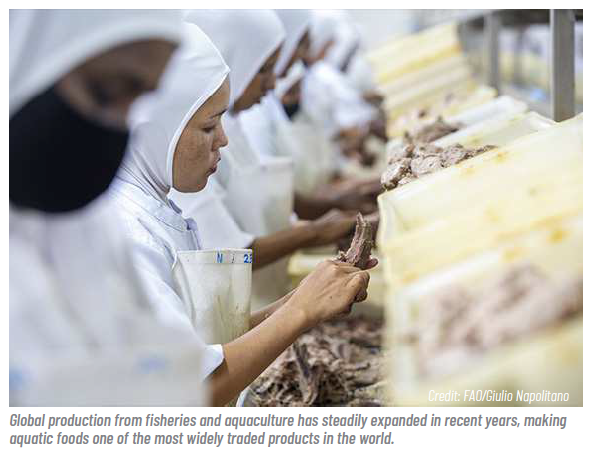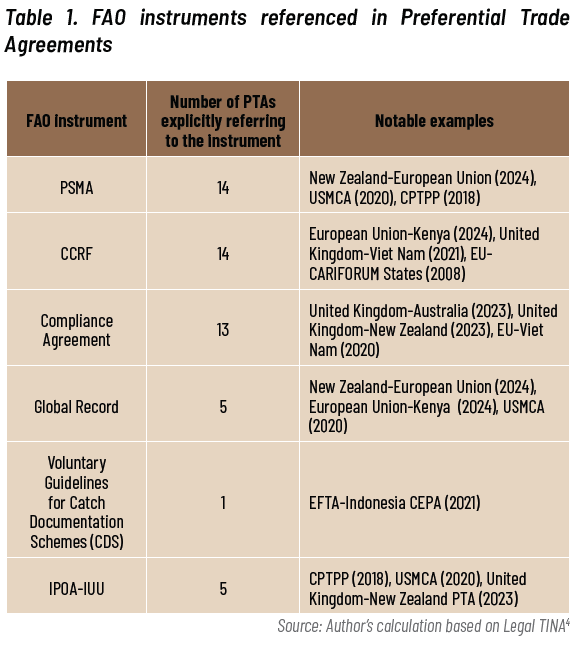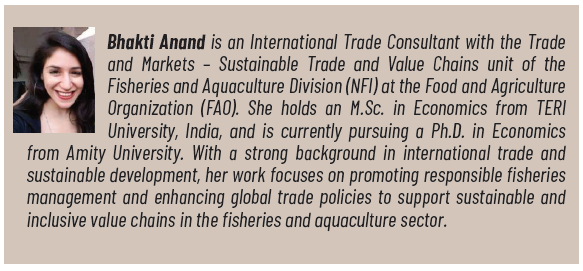Article II 3/2025 - NON-TRADITIONAL TRADE PROVISIONS AFFECTING MARKET ACCESS AND COMPETITIVENESS OF FISHERIES AND AQUACULTURE PRODUCTS

However, PTAs have evolved to incorporate non-traditional clauses that extend beyond the core commitments of tariff reduction and market access. Non-traditional trade provisions are additional provisions that address a range of broader issues, such as labour rights, environmental protection, digital trade and sustainable development, which have increasingly been incorporated into several new-generation trade agreements. These clauses are especially significant in fisheries and aquaculture as they promote sustainability and responsible resource management by integrating environmental measures.
Rise in fisheries-related non- traditional provisions in PTAs
According to FAO’s Ag-ERP database1, 164 fisheries provisions were found in 318 agreements analyzed between 1995 and 2022. From 1995 to 2001, very few PTAs initially included specific fisheries provisions. However, by 2018–2022, the number had increased nearly ninefold, making such provisions much more common. Similarly, the World Bank’s Deep Trade Agreement Database2 recorded 198 fisheries provisions across 400 agreements from 1958 to 2023. Furthermore, the TREND (Trade & Environment Database)3 suggests that 182 fisheries-related trade provisions were included in 775 agreements signed between 1947 and 2021.
A feature distinguishing the fisheries and aquaculture sector from other resource industries is its dependence on biological regeneration within the ocean’s finite productive capacity. Unlike non-renewable resources such as fossil fuels or fully controlled biological resources like agricultural crops and commercial forestry, fisheries rely on natural fish population cycles that can be disrupted by overfishing, that is, fishing beyond the Maximum Sustainable Yield (MSY). The MSY is the highest catch that can be continuously taken from a fish stock without jeopardizing its long-term health. Overfishing depletes existing stocks and affects regeneration rates, threatening long-term availability. This unique characteristic makes sustainability a critical concern for countries, leading to incorporating provisions in trade agreements that regulate fishing practices, prevent overexploitation, and ensure the long-term viability of marine resources.
Secondly, consumer awareness has substantially driven demand for sustainably sourced aquatic food, in uencing trade policies. The results from the GlobeScan Seafood Consumer Perceptions Study 2024 indicate that, across 23 countries surveyed, 74 percent of seafood consumers consider choosing sustainably sourced seafood an important motivator for their purchasing decisions. Thirdly, the shift toward ecosystem-based fisheries management—which considers broader environmental factors beyond fish stocks—has also in uenced international environmental norms, increasing pressure for trade policies that align with marine conservation objectives. As the seafood industry becomes increasingly globalized, trade policies play a crucial role in harmonizing environmental standards, mitigating trade distortions, and protecting the interests of developing countries that heavily rely on fish exports.
1 FAO Ag-ERP database compiles environmental provisions related to the agriculture, isheries and forestry sectors and can be accessed here
2 World Bank Deep Trade agreement database provides information on the content of eighteen policy areas (including isheries) frequently covered in preferential trade agreements and can be accessed here 3 The TREND database (updated in 2022) identiies nearly 300 different types of environmental provisions found in preferential trade agreements and can be accessed here.
Furthermore, trade liberalization promotes economic growth by reducing trade barriers. However, increased demand can lead to overfishing, overcapacity; illegal, unreported and unregulated (IUU) fishing; and subsidies on harmful fishing activities that ultimately reduce longterm supply. Trade agreements address this risk by incorporating sustainability clauses to prevent environmental degradation while facilitating market expansion. A major concern in the fisheries sector is the role of subsidies, which often lead to overcapacity and unsustainable fishing practices. Practices such as IUU fishing undermine sustainable fisheries management and create unfair competition. In addition to multilateral trade negotiations at the World Trade Organization (WTO), trade agreements can provide a framework to regulate these subsidies, ensuring that no country gains a competitive advantage through environmentally harmful practices.
Additionally, these agreements strengthen cooperation with Regional Fisheries Management Organizations (RFMOs), enhancing monitoring mechanisms to deter unsustainable fishing practices. Thus, trade agreements act as effective tools to discourage unsustainable practices. At the global level, the WTO Agreement on Fisheries Subsidies aims to curb subsidies that contribute to overfishing and IUU fishing; fishing on the unregulated high seas; and overfished fish stocks. Negotiations at the WTO continue to expand the coverage of the WTO Agreement on Fisheries Subsidies to include subsidies linked to overfishing and overcapacity, as outlined in the negotiation mandate.
Lastly, fisheries provide public goods such as biodiversity and healthy aquatic ecosystems; however, unsustainable practices threaten these benefits. Trade restrictions on unsustainably sourced aquatic foods encourage responsible fishing practices. As aquatic food markets expand, trade agreements are crucial in enforcing sustainability measures ensuring economic and ecological stability.
Types of non-traditional provisions in PTAs
Cooperation provisions foster collaboration among trading partners in sustainable fisheries practices, research, and policy alignment. These provisions can cover various areas, including enforcement, scientific collaboration, information sharing, regulatory harmonization, capacity-building assistance, and the establishment of joint institutions. These are the most commonly found provisions within trade agreements, owing to their neutral nature and enabling countries to make softer commitments.
Provisions about compliance and enforcement establish mechanisms that ensure the effective implementation of specific non-trade obligations made in trade agreements. These compliance and enforcement provisions in fisheries and aquaculture focus on issues such as IUU fishing, overfishing, habitat destruction, fisheries subsidies,
traceability, bycatch reduction, and the sustainable management of fish stocks and aquaculture practices. To ensure that sustainability commitments are complied with, these provisions establish enforcement mechanisms such as oversight committees, reporting requirements, and dispute resolution procedures. Some common key issues and areas, along with examples of policy measures, are discussed below.
• Fisheries subsidies, overfished stocks and IUU fishing
• Traceability, catch documentation schemes, vessel documentation
The compliance and enforcement provisions addressing traceability require parties to implement measures such as catch documentation schemes, vessel documentation and other measures to verify the legal provenance and ensure the trade of sustainably sourced sheries products. Strengthening monitoring, control, and surveillance (MCS) measures— including vessel tracking systems, observer programs, and port inspections—further reinforce efforts to enhance traceability. Compliance is enforced through requirements for vessel registration, monitoring systems, and collaboration with Regional Fisheries Management Organizations (RFMOs).
Some agreements require parties to maintain vessel documentation schemes and unique identifiers, such as the United States-Mexico-Canada Agreement (USMCA, 2020). Agreements such as the United Kingdom-New Zealand PTA (2023) and the New Zealand-European Union PTA (2024) encourage the adoption of measures facilitating traceability, including electronic traceability and certification. Similarly, the United Kingdom-Singapore PTA (2021) mandates the implementation of catch documentation or certification schemes to eliminate IUU products from trade flows. Various agreements enforce the catch documentation or certification schemes of RFMOs, as well as the adoption of effective control, monitoring, and enforcement of the RFMOs’ management measures, alongside the implementation of port measures. Some examples include European Union-Kenya (2024), United Kingdom-Viet Nam (2021), CPTPP (2018), USMCA (2020), and EUJapan (2019), among others.
This provision enforces measures that help verify the accuracy of catch records, prevent fraudulent documentation, and ensure compliance with sustainability standards. Many major markets, such as the European Union, the United Kingdom and the United States, impose strict import controls to avoid market entry of products originating from IUU fishing. By integrating MCS measures alongside traceability requirements, these provisions facilitate compliance with international trade regulations, enhance consumer confidence, and improve market access.
• Sustainable management of fisheries through increased cooperation with RFMOs
These provisions emphasize cooperation with RFMOs to ensure effective governance, conservation, and responsible trade in fisheries products. They require parties to actively participate in RFMOs by adopting conservation and management measures, supporting scientific research, and strengthening compliance mechanisms. Additionally, they promote the periodic review of RFMO performance and encourage the adoption of MCS measures, including port-State controls, vessel tracking systems, and catch documentation schemes to combat IUU fishing.
Compliance is enforced through obligations to implement RFMO regulations at the national level; mandatory reporting on conservation efforts; and collaboration with international enforcement initiatives. Agreements such as European Union- Kenya (2024), EU-Colombia and Peru (2013), EU-Eastern and Southern Africa States (2012), CPTPP (2018), United Kingdom- Viet Nam (2021), and New Zealand-European Union PTA (2024) include commitments to strengthen RFMO governance and ensure the effective enforcement of fisheries management measures.
By aligning fisheries management with RFMO-led sustainability initiatives, these provisions enhance the credibility of fisheries product exports, ensuring compliance with the sustainability standards of major import markets. Strengthened cooperation with RFMOs supports long-term resource availability; facilitates responsible trade; and prevents market disruptions caused by unsustainable fishing practices.
Provisions on consultation
Consultation provisions are commonly found in PTAs; they are used to accommodate and incorporate different perspectives on environmental protection; address sustainability concerns; and align environmental regulatory approaches among PTA partners. They enhance inclusion through stakeholder engagement, fostering more inclusive decision-making that re ects the needs of both industry participants and conservation efforts. These provisions also play a crucial role in facilitating market access and competitiveness by ensuring regulatory alignment with key trading partners and facilitating dispute resolution, thereby promoting smoother trade ows between partners.
Provisions reafirming commitments of international environmental agreements
PTAs often include provisions that reafirm commitments to key international environmental agreements, ensuring that fisheries and aquaculture practices align with globally recognized standards for sustainability and conservation. These provisions reinforce adherence to agreements such as the United Nations Convention on the Law of the Sea (UNCLOS); the UN Fish Stocks Agreement (fisheries management of highly migratory and straddling fish stocks); the Convention on International Trade in Endangered Species of Wild Fauna and Flora, i.e. CITES (governing wildlife trade of endangered species); and FAO instruments. They also integrate animal welfare guidelines and standards developed by organizations like the World Organisation for Animal Health.
FAO instruments within non-traditional provisions in PTAs
One key example comprises the provisions linked to the implementation of the FAO Port State Measures Agreement (PSMA), which aim to prevent, deter, and eliminate illegal, unreported, and unregulated (IUU) fishing by prohibiting vessels possibly engaged in IUU fishing from using ports and landing their catches. Requiring port inspections and information exchange among parties strengthens compliance and enforcement mechanisms within PTAs referencing PSMA. This facilitates market access for sustainably sourced fisheries products by preventing fisheries products associated with IUU fishing activities from entering trade flows, thereby enhancing consumer confidence and preventing unfair competition from IUU-linked operators.
Furthermore, several agreements reafirm a commitment to adhere to the principles and objectives outlined in the FAO Code of Conduct for Responsible Fisheries (CCRF). The CCRF outlines fundamental principles to be followed, encouraging responsible practices that ensure the sustainability and preservation of living aquatic resources and the environment, including protecting the ecosystem’s biodiversity.
Many PTAs increasingly reafirm commitments made in the FAO Compliance Agreement, formally known as the FAO Agreement to Promote Compliance with International Conservation and Management Measures by Fishing Vessels on the High Seas. This Agreement aims to enhance the role of flag States and requires a State to strengthen its control over its vessels to ensure compliance with international conservation and management measures.
Additionally, many PTAs incorporate FAO’s Global Record of Fishing Vessels, Refrigerated Transport Vessels, and Supply Vessels, enhancing transparency, traceability, and accountability in fisheries. The Global Record is an international database that compiles vessel identification, ownership, and operational history, helping authorities track and verify fishing activities to prevent IUU fishing.
These PTAs also reinforce trade-related sustainability efforts by incorporating the FAO Voluntary Guidelines for Catch Documentation Schemes (CDS) to support the development of standardized certification mechanisms for verifying the legal provenance of fisheries products. Lastly, the PTAs incorporate the International Plan of Action to Prevent, Deter, and Eliminate IUU Fishing (IPOA-IUU), which serves as a strategic framework for nations to implement measures against IUU fishing, guiding trade policies that align with responsible fisheries governance.
Table 1 provides an overview of different FAO instruments referenced in PTAs.

Conclusion
4 Legal TINA is a tool developed by the United Nations Economic and Social Commission for Asia and the Pacific that provides guidance and analytical capabilities on the legal provisions of trade agreements, covering more than 365 preferential trade agreements signed between 1945 and 2025 and can be accessed here.
























